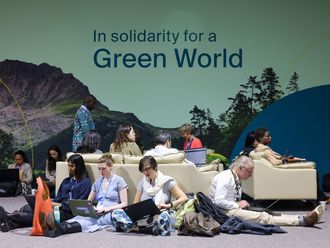
‘The future belongs to those who innovate, adapt, and lead with responsibility.’
Imagine a classroom without walls, where lessons adapt to each student’s unique pace, and learning is not confined to a single location or time. This vision is not just aspirational; it’s happening now in the UAE, driven by the visionary leadership and strategic investments of Sheikh Hamdan bin Mohammed bin Rashid Al Maktoum, Crown Prince of Dubai, Deputy Prime Minister and Minister of Defence of the UAE.
With the integration of artificial intelligence (AI), education in the UAE is no longer bound by traditional constraints. Instead, it is evolving into an inclusive, dynamic, and personalized experience, setting new global standards for the future of learning.
As a university, we witness firsthand how AI-powered education shifts away from the old, one-size-fits-all approach. Today, adaptive learning platforms tailor content to each student’s strengths and learning styles, acting as personal tutors that provide real-time feedback.
For those who struggle, these systems offer targeted support to guide them through difficult concepts, while high-achieving students are challenged to go beyond the standard curriculum, fostering deeper curiosity and confidence.
“Anytime, anywhere” learning
The engagement and learning outcomes we see among students who use these tools are beyond anything that was conceivable a decade ago. The concept of “anytime, anywhere” learning is now a reality within our educational system. Students often attend virtual classes featuring renowned educators from different parts of the world or participate in virtual tours that bring historical and scientific concepts to life.
AI-driven simulations have allowed them to perform chemistry experiments or even explore ancient sites without ever leaving the classroom. With educational tools accessible from any device, learning has become seamless, untethered from the traditional constraints of time and place. Knowledge is now as close as a tap on a screen, and students are taking full advantage of this new accessibility.
Another powerful development is the gamification of learning through AI. What were once mundane lessons are now interactive challenges that students eagerly engage with. From learning new languages through conversations with AI-driven avatars to solving complex math problems through immersive games, AI has made the learning process enjoyable and impactful.
This isn’t just about fun; the excitement translates to better retention and a deeper understanding of material. However, as AI becomes more deeply integrated into education, it’s impossible to ignore the ethical considerations and challenges that come with it. Data privacy and security are top of mind for educational institutions like ours, as AI systems often require significant amounts of student data.
The risk of biases within algorithms is another concern; if left unchecked, these could perpetuate existing inequalities. That’s why the UAE continues embedding lessons on digital ethics and responsible AI use into its educational programs. We’re not just teaching students how to use AI; we’re equipping them to think critically about its role in society, preparing them to use this powerful tool conscientiously and ethically.
One initiative that exemplifies the UAE’s ambitious educational goals is Sheikh Hamdan’s plan to train one million people in AI by 2033. This project is more than a plan to boost digital literacy; it’s an investment in the future resilience of society. The AI skills gained will extend beyond classrooms to offices, boardrooms, and public sectors, making the UAE not only a participant in the AI era but a leader. From our perspective as a university, this is a game changer, creating a society where innovation and adaptability are second nature.
AI labs and innovation hubs
UAE universities, including University of Dubai, are rapidly adapting their curricula to align with these advancements. Programs in data science, machine learning, and robotics are tailored to meet the demands of an ever-changing job market.
The establishment of AI labs and innovation hubs has provided students with hands-on experience, allowing them to apply theory to real-world problems. It’s inspiring to see students working on projects that tackle challenges like sustainable energy or urban development, turning learning into a journey of discovery and entrepreneurship.
Benchmarking against global leaders like Finland, Singapore, and South Korea, it’s clear that the UAE is not just keeping pace but setting its own course. Finland’s integration of AI for personalized learning and Singapore’s Smart Nation initiative provide valuable lessons, but what sets the UAE apart is its holistic approach. Here, AI is not only used for learning but is integrated with responsible innovation, creating spaces where students can develop, test, and refine ideas.
Despite the many advantages, integrating AI into education comes with its set of challenges. Equitable access remains a priority; ensuring that every student, regardless of background, can benefit from AI-driven tools is essential for true educational progress.
Ethical considerations must also remain at the forefront to prevent misuse and maintain public trust. Addressing these challenges requires continuous assessment, transparency, and collaboration between educators, policymakers, and tech developers. Sheikh Hamdan’s vision is not just reshaping classrooms but reimagining what education can be. It’s about creating a system that empowers students to think critically, innovate, and lead.
By harnessing the power of AI, the UAE is making education a transformative experience—one that prepares students not just for jobs but for meaningful, impactful futures.
This shift is more than an educational reform; it’s a blueprint for how nations can create resilient, future-ready generations. As a university, we are proud to be part of this journey, witnessing the positive impact on our students and knowing that we are contributing to a global model of educational excellence.
Dr Sania Ashraf and Dr Areej A. Siddiqui are faculty at the Dubai Business School, University of Dubai













